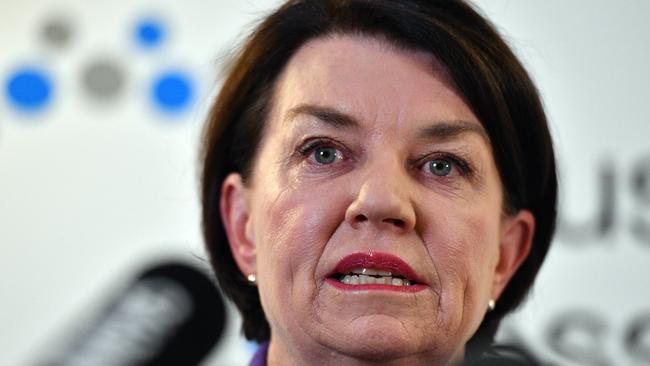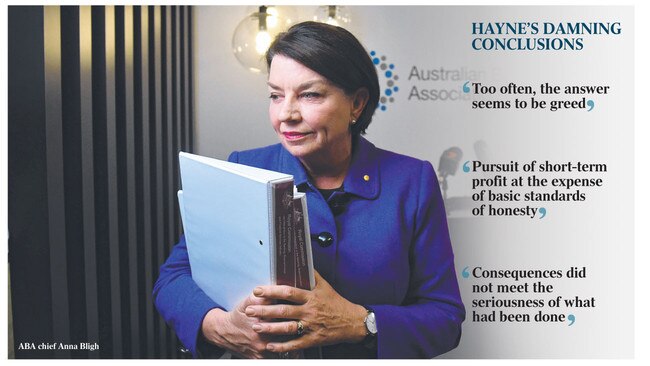Royal commission: Banks face tougher regulation as Hayne slams lenders, watchdog
Banking royal commissioner Kenneth Hayne has laid the groundwork for a leaner, meaner regulatory system.

Banking royal commissioner Kenneth Hayne has laid the groundwork for a leaner, meaner financial services regulatory system in an interim report that laid bare a culture of greed within banking, flagged criminal charges against AMP and exposed the inaction of the corporate and prudential watchdogs.
In his report, which asked a series of questions but stopped short of making policy recommendations, Mr Hayne said many of the sector’s woes were due to “the pursuit of short term profit at the expense of basic standards of honesty” and flagged competition policy as a key area for overhaul.
The same banks that have shrugged off an apparently inexhaustible flow of inquiries and reviews over the past decade yesterday rushed to promise an immediate improvement in their behaviour, with Australian Banking Association chief executive Anna Bligh calling it a “day of shame” for the industry.
The inquiry has also whipped into action the Australian Securities & Investments Commission, which Mr Hayne’s report reveals is now close to charging AMP with criminal offences over its alleged lies to the regulator regarding a fees-for-no-service scandal.
ASIC chairman James Shipton acknowledged Mr Hayne’s “serious and important observations of ASIC’s role as a regulator”, promising to “carefully consider” the criticisms in a full submission due next month.

However, sister agency the Australian Prudential Regulation Authority was yesterday shocked into silence by Mr Hayne’s criticism of it for never launching legal action against the companies it regulates.
Yesterday’s report deals with the first four of the seven rounds of hearings conducted by the commission, which dealt with consumer credit including responsible lending, financial advice, fees for no service, lending to small business, agricultural lending and Aboriginal and remote communities.
The report also took aim at lacklustre competition policy that has been overseen and workshopped by a broader suite of financial regulators, including the government’s policy arm, Treasury, the Reserve Bank, and the Productivity Commission, which has recently slammed APRA for dampening competition at consumers’ expense.
The failure of Australia’s regulatory architects to foster vigorous competition among financial companies, and the reluctance of authorities to allow large companies to lose money, contributed both to the misconduct and to the failure to tackle wrongdoing, Mr Hayne said.
After banks survived the global financial crisis and were “prudentially regulated against failure”, profit became their defining measure of success at the same time that risk to reputation “was ignored”.
“The law sets the bounds of permissible behaviour. If competitive pressures are absent, if there is little or no threat of enterprise failure, and if banks can and do mitigate the consequences of failing to meet obligations, only the regulator can mark and enforce those bounds,” Mr Hayne said.
He said the regulators failed to properly police the sector because APRA was overly concerned with preventing companies from failing, while ASIC’s remit was too large and it was too friendly to banks, and its enforcement did not adapt to the economic environment.
“The conduct regulator, ASIC, rarely went to court to seek public denunciation of and punishment for misconduct,” he said.
“The prudential regulator, APRA, never went to court.”
Treasury recently argued for APRA to ignore competition considerations in its regulation, as requiring them to do so “would only distract them from meeting their primary objectives” of stability, in a scathing criticism of a Productivity Commission review of the financial sector.
But Mr Hayne said ASIC might be at a turning point under its new chair.
“As the commission’s work has continued, there are signs that ASIC may be seeking to alter its approach to enforcement,” Mr Hayne said. “Even so, I remain to be persuaded that it can and will make the necessary changes.”
Mr Hayne also noted that the finalisation of new powers and increased penalties for ASIC has been said to depend on the findings of the commission, but said they would have only limited effect “unless there is greater willingness to seek their application”.
He signalled a further move away from the disclosure-based free market model of regulation adopted in Australia after the Wallis inquiry in 1997, which has already been undermined in the past few years as a series of finance sector scandals drove a move towards consumer protection-oriented laws. Mr Hayne said the Wallis inquiry “reflected the prevailing conditions of deregulation and globalisation” at the time, together with the view that competition in financial markets would diminish the role of banks and lower costs to consumers.
However, since Wallis the opposite had happened — “banks’ accumulation of wealth management businesses accelerated”, he said.
There are calls to hand greater responsibility for financial regulation to the Australian Competition & Consumer Commission, which government reviews have found to be a tougher litigant than ASIC.
While David Murray’s Financial System Inquiry did not seek to overhaul the regulatory system, he suggested a regulator assessment board to mark the watchdogs against their mandates.
Bank shares rose yesterday afternoon because investors had feared an even harsher report.
Additional reporting: Melissa Yeo



To join the conversation, please log in. Don't have an account? Register
Join the conversation, you are commenting as Logout